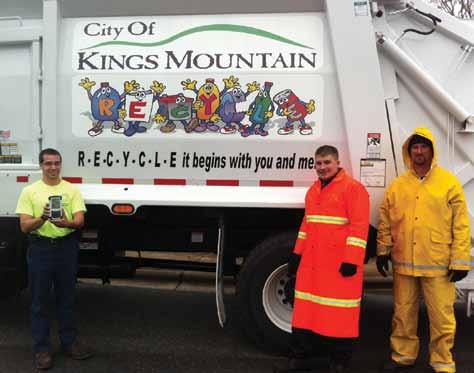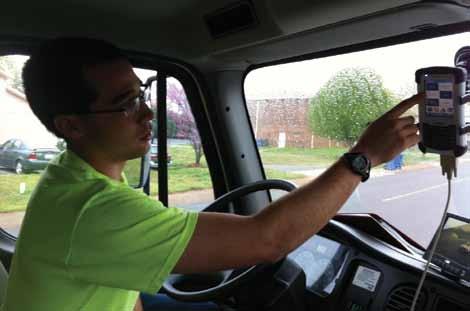
4 minute read
Cleaning up with new technology
Jackie Barnette
Public Works Director City of Kings Mountain, North Carolina
Advertisement
dvances in technology are all around us—smaller, faster work computers, smarter phones, the ability to connect to the Internet from almost anywhere. And so it’s always a good idea for municipalities and organizations to search for the best ways to include high-tech tools in their work processes.
That doesn’t mean you start buying every gizmo that hits the market, but when you look at an existing process or a new program and ask how it could be done better, you definitely should explore all your technology options.
That’s what my city did for our new curbside recycling program, and we ended up with a simple but effective system that has proved to be both time- and cost-efficient for us. Our public works department is using a combination of a handheld computer, a customized software program and a rugged radio frequency identification (RFID) antenna and reader.
And we have ideas for how to use the technology to do even more. Lots of ideas.
It started with a sales call from Mack McCarter of LogicConcepts, a technology company that specializes in data collection systems. He contacted us about streamlining our sanitation collection process—“get the right people to the right place, save gas,” is how he described it. I was open to his idea, but I had something else in mind, too. We were just developing a curbside recycling program, with a grant from the state of North Carolina to get started. And the grant indicated a preference for using RFID readers to track recycling participation.
We had previously considered using handheld computers for other applications, but we hadn’t been able to justify the cost. But a handheld computer with RFID capability built in? With this grant program we had some real justification. So we put together a package of tools that would do the job.
First we had a customized software program created. It was based on a simple programmable touchscreen interface, with buttons for different data-gathering functions. This would let our workers use a simple button-level approach to collect information.
We needed a compatible piece of hardware with specific functionality for field work, and we chose the Nautiz X7 rugged handheld from Handheld US. It has RFID
The City of Kings Mountain’s new recycling program used handheld computers and RFID technology to divert nearly 600 tons of waste from the local landfill in its first year—17 percent of the city’s total residential waste.
capability and integrated GPS, plus an autofocus flash camera, voicenote capability, a non-reflecting touchscreen and long battery life. It’s light, but rugged enough for our purposes—for example, it’s impervious to dust and water.
The final piece of the puzzle was the RFID-specific functionality. We connected with an outfit that provided an RFID reader and antenna combination that maintained the handheld’s waterproofing, dustproofing and vibration resistance.
Once we had the entire system, we put it to work. The recycling program’s overall goals are straightforward: haul less garbage to the landfill, pay less in landfill charges, save money while helping the environment. But at the detail level we need to know which households are doing what.
First, our crews attached a corresponding street address to each of the roughly 4,200 recycling containers, which came with RFID chips embedded in them. Then we split the sanitation district into 10 zones—the pickup schedule is once every two weeks, so there are 10 different daily routes.
Using the dash-mounted handheld, our field workers check recycling containers as they follow their route. The software’s “button design” also lets them gather detailed information: Is there a container out at each address, does the container match the address, is it full or halffull, are there non-recyclables mixed in, does the container need repair or replacement?
The handhelds have built-in WiFi, so at the end of their shift our workers upload the day’s data directly to our central public works computer with one touch of a button.
Our department uses the information in a variety of ways— but most important, we use it to measure the success of the recycling program.
The system is really user-friendly, and the workers love it. We can tell how much participation there is in each zone. We target the zones with lower participation levels, providing those folks with more education on the benefits of the program. Having the RFID data helps us allocate our resources where they’re most needed.
Mission accomplished, then. But now we have this high-tech tool…
Once we got the system working and accomplished our initial scope, we quickly recognized that we had the ability to do additional types of data-gathering. The software offers many more options—we can track low-hanging branches, roadside garbage and more.
And our local gas utility is looking at this technology too. They could locate all the valves in town, document incidents and solutions, and ensure regulatory compliance. The city could also use it for stormwater management, police and fire, asset management…it’s like a library of applications our people can share—and we can adapt it to almost any need.
In our first year with this new technology and our new recycling program, we diverted 17 percent of our city’s residential waste from the landfill—592 tons. The longer we do this, the more awareness we’re going to raise, and the more we can accomplish. And as we find new ways to use this technology, it’ll have an ever-growing impact.

Kings Mountain’s RFID system tracks the location and status of every recycling container in the program. By using a mobile computer and program-specific software, workers can receive and send data in real time from their vehicles as they work their routes—avoiding paperwork, data-entry time and manual-entry errors.
Jackie Barnette can be reached at (704) 734-0735 or jackieb@cityofkm.com.










